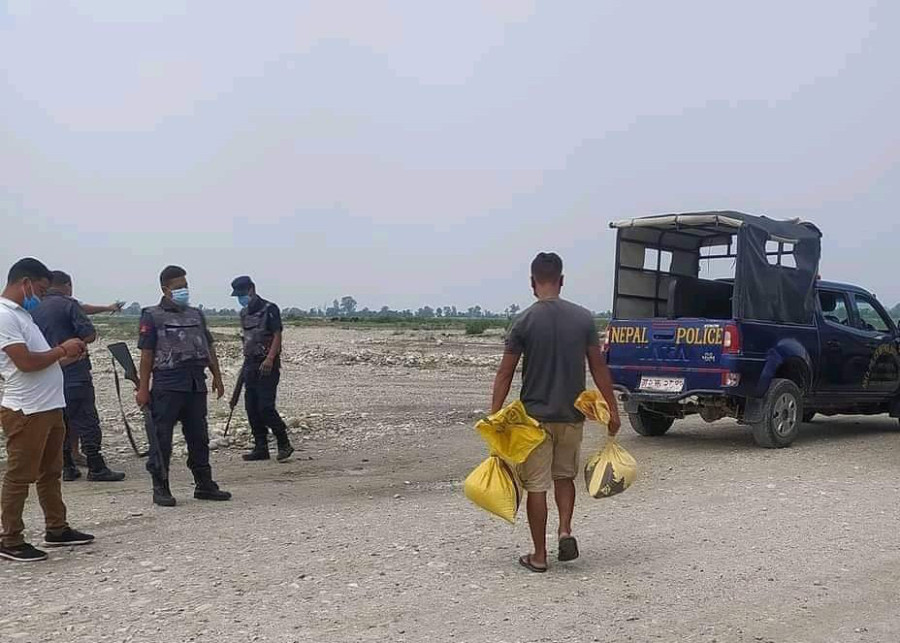Money
Paddy transplantation begins amid fertiliser shortage fears
Officials at Agriculture Inputs Company say that sales resumed last week but stocks would not last long at any depot or cooperative due to panic buying.
Sangam Prasain, Bhawani Bhatta & Mohan Budhaair
Paddy farmer Parsu Chaudhary of Gadariya, Kailali is happy that the monsoon arrived on time this year, and has plunged into transplanting work. But this year too, like every year, there's something nagging at the back of his mind: Will there be adequate supply of chemical fertiliser?
“I transplanted my paddy seedlings without waiting to apply diammonium phosphate (DAP), the world's most widely used phosphorus fertiliser. Because, I cannot let the rain pass.”
Another farmer Kamal Bam in Ghodaghodi Nimdi has also transplanted paddy by using very little chemical fertiliser. “I made rounds of the cooperatives to get fertiliser,” he said. Bam says he needs at least 10 sacks of fertiliser for his 4-bigha farm. “I managed to get only four sacks after making trips to the cooperatives for days.”
Tens of thousands of Nepali farmers are quite worried that there could be a repeat of last year's fertiliser shortage, which made them miss out on a super harvest since the monsoon rains were good and labour was plentiful, as Nepalis working in various parts of India had returned home to escape the pandemic.
But this year the shortage is not because of the unavailability of chemical fertilisers. The Covid-19 Crisis Management Operations Centre Steering Committee, which has blanket authorisation to take measures to stop the spread of Covid-19, has removed fertiliser from the list of “essential commodities”, barring it from being transported. At the same time, farmers are confined to their homes by the lockdown.
Officials at Agriculture Inputs Company, the main supplier of state-subsidised chemical fertiliser, said that sales resumed last week but stocks would not last long at any depot or cooperative due to panic buying.
The annual life-giving rains formally started falling on Nepal on June 11. According to the Meteorological Forecasting Division, monsoon clouds entered the country from the east and have spread to Province 1, Province 2 and Bagmati Province.
Bishnu Prasad Pokhrel, spokesperson for Agriculture Inputs Company, said that there was some problem with the distribution system during the lockdown. “But the hitch has now been resolved.”
According to Pokhrel, since last week, they have been selling more than 2,000 tonnes of fertiliser daily. “We have enough fertiliser—in the warehouse and on the way—to meet the requirement of the paddy transplantation season.”
Paddy is planted on nearly 1.5 million hectares of land across Nepal, and it is the major source of income for around 60 percent of the population.
The agriculture sector contributes 26 percent to the national gross domestic product with paddy alone accounting for 7 percent. Paddy transplantation begins in June when the monsoon drenches the land. Harvesting starts in November.
The country’s economic growth is mostly dictated by paddy production as many Nepalis depend on agriculture for their livelihood.
Farmers suffered huge losses last year due to a shortage of fertiliser during the key transplantation period.
Nawal Singh Bogati, chief of the Agriculture Inputs Company provincial office, said although they had enough stock at the warehouse, they were unable to distribute it to the cooperatives because the banks had shut down.
“The local administration has allowed banks to open for 2 hours daily from last week, and accordingly we started to distribute the fertiliser. There is no problem with the distribution mechanism now.”
The four-month-long paddy cultivation season requires 110,000 tonnes of urea and 60,000 tonnes of DAP.
Pokhrel said that Agriculture Inputs Company currently had 30,900 tonnes of DAP and 18,500 tonnes of urea in stock. “Another consignment of 50,000 tonnes of urea is on the way, including 19,500 tonnes imported from Bangladesh under a government-to-government deal,” he said.
“There were sporadic shortages caused by disruptions to the supply chain. But now the glitch has been resolved,” said Pokhrel, adding that there would be no shortage of chemical fertiliser during this paddy transplantation period.
Many farmers in the plains go to markets near the southern border to buy contraband fertiliser as there is a big gap in demand and supply.
According to the Agriculture Ministry, the annual demand for chemical fertiliser currently stands at more than 700,000 tonnes while official imports amount to just around 300,000 tonnes. Subsidised fertiliser fulfils 40 percent of the country’s total requirement while the rest is met by informal imports or shipments smuggled across the open border.
"But from last year, due to the Covid-19 pandemic, it has been difficult for farmers to buy smuggled plant nutrients," said Ganga Chaudhary of Thapapur in Kailali. “The government never fulfilled its obligation to distribute an adequate amount of fertiliser.”
Last Saturday, police seized some quantity of chemical fertiliser that was being brought by a group of women in Dodhara Chandani in Kanchanpur. The local administration in Kanchanpur has also seized some amounts of contraband chemical fertiliser stored in warehouses.
Farmers are worried because the government is not providing them with fertiliser while the local administration is also tightening the border to stop smuggling, they said.




 14.12°C Kathmandu
14.12°C Kathmandu
















